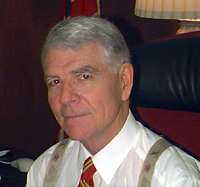Thomas F. Hogan
Thomas Francis Hogan (born 1938) is a Senior United States District Judge of the United States District Court for the District of Columbia, who served as Director of the Administrative Office of the United States Courts from October 17, 2011 until June 30, 2013.
Education
Hogan was born in Washington, D.C. He graduated from the Georgetown Preparatory School in 1956, receiving an Artium Baccalaureus degree (classical) from Georgetown University in 1960. He attended George Washington University’s masters program in American and English literature from 1960 to 1962, and he graduated with a Juris Doctor from the Georgetown University Law Center in 1966, where he was the St. Thomas More Fellow. Following law school, Hogan clerked for Judge William Blakely Jones of the United States District Court for the District of Columbia from 1966 to 1967.[1]
Experience
Hogan served as counsel to the National Commission for the Reform of Federal Criminal Laws from 1967 to 1968, and was engaged in private practice from 1968 to 1982, in Rockville, Maryland, Chevy Chase, Maryland and Washington, D.C. He was an Assistant professor at Potomac School of Law from 1977 to 1979. He was an adjunct professor of law at the Georgetown University Law Center from 1986 to 1992, and has also been a Master of the Prettyman-Leventhal Inn of Court. He served as a member of the Executive Committee of the United States Judicial Conference and served as the Judicial Conference's chair of the Courtroom Technology Subcommittee. Additionally he served as a member of the Board of the Federal Judicial Center.[1]
Federal judicial service
Hogan was nominated by President Ronald Reagan on August 10, 1982, to a seat on the United States District Court for the District of Columbia vacated by Judge William B. Bryant. He was confirmed by the United States Senate on August 20, 1982, and received commission on August 20, 1982. He served as Chief Judge from June 19, 2001 to May 1, 2008. He assumed senior status on May 1, 2008.[1] He served from 2009 to 2016 on the United States Foreign Intelligence Surveillance Court and served as Presiding Judge of that court from 2014 to 2016.[2][3]
Notable case
Congress passed the Line Item Veto Act of 1996 to control "pork barrel spending" that favors a particular region rather than the nation as a whole. President Bill Clinton used the line item veto 11 times, striking spending on 82 items.[4][5] The first case challenging the line-item veto was ordered dismissed by the Supreme Court for lack of standing, vacating the trial court's decision finding that the veto was unconstitutional. Raines v. Byrd, 521 U.S. 811 (1997). In the second case, Hogan ruled February 12, 1998, that such unilateral amendment or repeal of only parts of statutes violated the U.S. Constitution. This ruling was affirmed on June 25, 1998, in a 6-3 decision of the Supreme Court of the United States in the case Clinton v. City of New York.
References
- 1 2 3 "Hogan, Thomas Francis - Federal Judicial Center". www.fjc.gov.
- ↑ "The Foreign Intelligence Surveillance Court: 2013 Membership". Federation of American Scientists. Retrieved June 9, 2013.
- ↑
John Shiffman, Kristina Cooke (2013-06-21). "The judges who preside over America's secret court". Reuters. Archived from the original on 2013-06-23. Retrieved 2013-07-01.
Twelve of the 14 judges who have served this year on the most secret court in America are Republicans and half are former prosecutors.
- ↑ "CNN".
- ↑ "History of Line Item Veto Notices". www.access.gpo.gov.
Sources
- Brief Biography on the DC District Court's website
- Thomas Francis Hogan at the Biographical Directory of Federal Judges, a public domain publication of the Federal Judicial Center.
| Legal offices | ||
|---|---|---|
| Preceded by William B. Bryant |
Judge of the United States District Court for the District of Columbia 1982–2008 |
Succeeded by James E. Boasberg |
| Preceded by Norma Holloway Johnson |
Chief Judge of the United States District Court for the District of Columbia 2001–2008 |
Succeeded by Royce Lamberth |
| Preceded by Robert C. Broomfield |
Judge of the United States Foreign Intelligence Surveillance Court 2009–2016 |
Succeeded by Rudolph Contreras |
| Preceded by James C. Duff |
Director of the Administrative Office of the United States Courts 2011–2013 |
Succeeded by John D. Bates |
| Preceded by Reggie Walton |
Presiding Judge of the United States Foreign Intelligence Surveillance Court 2014–2016 |
Succeeded by Rosemary M. Collyer |
